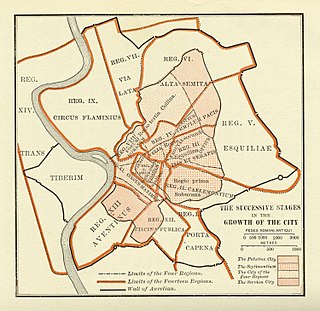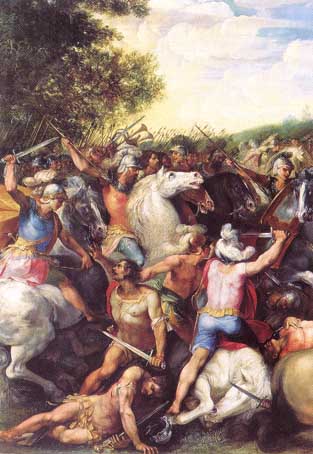External links
- (in English) Eduardo Vila-Echagüe, Lucius Tarutius and the foundations of Rome
 Donne, William Bodham (1870). "Firmanus, Tarutius". In Smith, William (ed.). Dictionary of Greek and Roman Biography and Mythology . Vol. 2. p. 151.
Donne, William Bodham (1870). "Firmanus, Tarutius". In Smith, William (ed.). Dictionary of Greek and Roman Biography and Mythology . Vol. 2. p. 151.
Lucius Tarutius Firmanus (or Lucius Tarutius of Firmum ) (unknown-fl. 86 BC) was a Roman philosopher, mathematician, and astrologer (Taruntius or Tarrutius are also used, but are incorrect).
Tarutius was a close friend of both Marcus Terentius Varro and Cicero. At Varro's request, Tarutius took the horoscope of Romulus. After studying the circumstances of the life and death of the founder of Rome, Tarutius calculated that Romulus was born on March 24 (when the date is correctly translated from the Egyptian calendar) in the second year of the second Olympiad (i.e. 771 BC). He also calculated that Rome was founded on 4 October 754 BC, between the second and third hour of the day (Plutarch, Rom., 12; Cicero, De Divin., ii. 47.). [1] The proximity of this date to an eclipse was discussed by Scaliger. [2]

The Roman Kingdom was the earliest period of Roman history when the city and its territory were ruled by kings. According to oral accounts, the Roman Kingdom began with the city's founding c. 753 BC, with settlements around the Palatine Hill along the river Tiber in central Italy, and ended with the overthrow of the kings and the establishment of the Republic c. 509 BC.

The tale of the founding of Rome is recounted in traditional stories handed down by the ancient Romans themselves as the earliest history of their city in terms of legend and myth. The most familiar of these myths, and perhaps the most famous of all Roman myths, is the story of Romulus and Remus, twins who were suckled by a she-wolf as infants. Another account, set earlier in time, claims that the Roman people are descended from Trojan War hero Aeneas, who escaped to Italy after the war, and whose son, Iulus, was the ancestor of the family of Julius Caesar. The archaeological evidence of human occupation of the area of modern-day Rome dates from about 14,000 years ago.
Lucius Accius, or Lucius Attius, was a Roman tragic poet and literary scholar. Accius was born in 170 BC at Pisaurum, a town founded in the Ager Gallicus in 184 BC. He was the son of a freedman and a freedwoman, probably from Rome.
Marcus Terentius Varro was a Roman polymath and a prolific author. He is regarded as ancient Rome's greatest scholar, and was described by Petrarch as "the third great light of Rome". He is sometimes called Varro Reatinus to distinguish him from his younger contemporary Varro Atacinus.

Pater Patriae, also seen as Parens Patriae, is a Latin honorific meaning "Father of the Country", or more literally, "Father of the Fatherland".
Appius Claudius Pulcher was a Roman patrician, politician and general in the first century BC. He was consul of the Roman Republic in 54 BC. He was an expert in Roman law and antiquities, especially the esoteric lore of the augural college of which he was a controversial member. He was head of the senior line of the most powerful family of the patrician Claudii. The Claudii were one of the five leading families which had dominated Roman social and political life from the earliest years of the republic. He is best known as the recipient of 13 of the extant letters in Cicero's ad Familiares corpus, which date from winter 53–52 to summer 50 BC. Regrettably they do not include any of Appius' replies to Cicero as extant texts of any sort by members of Rome's ruling aristocracy are quite rare, apart from those of Julius Caesar. He is also well known for being the older brother of the infamous Clodius and Clodia.

The gens Marcia, occasionally written Martia, was one of the oldest and noblest houses at ancient Rome. They claimed descent from the second and fourth Roman Kings, and the first of the Marcii appearing in the history of the Republic would seem to have been patrician; but all of the families of the Marcii known in the later Republic were plebeian. The first to obtain the consulship was Gaius Marcius Rutilus in 357 BC, only a few years after the passage of the lex Licinia Sextia opened this office to the plebeians.
Marcus Terentius Varro Lucullus, younger brother of the more famous Lucius Licinius Lucullus, was a supporter of Lucius Cornelius Sulla and consul of ancient Rome in 73 BC. As proconsul of Macedonia in 72 BC, he defeated the Bessi in Thrace and advanced to the Danube and the west coast of the Black Sea. In addition, he was marginally involved in the Third Servile War.
The gens Terentia was a plebeian family at ancient Rome. Dionysius mentions a Gaius Terentius Arsa, tribune of the plebs in 462 BC, but Livy calls him Terentilius, and from inscriptions this would seem to be a separate gens. No other Terentii appear in history until the time of the Second Punic War. Gaius Terentius Varro, one of the Roman commanders at the Battle of Cannae in 216 BC, was the first to hold the consulship. Members of this family are found as late as the third century AD.

The gens Axia, also spelled Axsia, was a plebeian family at Rome during the final century of the Republic and the beginning of the Empire. The gens does not appear to have been particularly large or important, although at least some of the family were reasonably wealthy.
The gens Modia was a minor family at Ancient Rome, known from a small number of individuals.

The gens Hostilia was an ancient family at Rome, which traced its origin to the time of Romulus. The most famous member of the gens was Tullus Hostilius, the third King of Rome; however, all of the Hostilii known from the time of the Republic were plebeians. Several of the Hostilii were distinguished during the Punic Wars. The first of the family to obtain the consulship was Aulus Hostilius Mancinus in 170 BC.
The gens Cosconia was a plebeian family at Rome. Members of this gens are first mentioned in the Second Punic War, but none ever obtained the honours of the consulship; the first who held a curule office was Marcus Cosconius, praetor in 135 BC.
The gens Cossinia was a plebeian family at Rome. The gens originated at Tibur, and came to Rome early in the first century BC. None of its members ever obtained the higher offices of the state.

The gens Curtia was an ancient but minor noble family at Rome, with both patrician and plebeian branches. The only member of the gens invested with the consulship under the Republic was Gaius Curtius Philo, in 445 BC. A few Curtii held lesser magistracies during the Republic, and there were two consuls suffectus in imperial times. However, the gens is best remembered from a series of legends dating from the traditional founding of the city to the early Republic.

The gens Fundania was a plebeian family at Ancient Rome, which first appears in history in the second half of the third century BC. Although members of this gens occur well into imperial times, and Gaius Fundanius Fundulus obtained the consulship in BC 243, the Fundanii were never amongst the more important families of the Roman state.
The gens Manilia was a plebeian family at ancient Rome. Members of this gens are frequently confused with the Manlii, Mallii, and Mamilii. Several of the Manilii were distinguished in the service of the Republic, with Manius Manilius obtaining the consulship in 149 BC; but the family itself remained small and relatively unimportant.
The gens Numeria was a minor plebeian family at ancient Rome. Few of its members held any of the higher offices of the Roman state.
The gens Tremellia was a minor plebeian family at ancient Rome. Members of this gens are first mentioned towards the end of the Second Punic War, but the highest rank ever attained by any of the Tremellii under the Republic was that of praetor. After falling into obscurity during the first century BC, the fortunes of this family briefly revived under the Empire, when Gnaeus Tremellius was appointed consul suffectus in AD 21, during the reign of Tiberius.
The gens Tarutia, also found as Tarrutia, was an obscure plebeian family at ancient Rome. Few members of this gens are mentioned in Roman history, of whom the best-known is probably Lucius Tarutius Firmanus, a noted mathematician and astrologer of the first century BC.